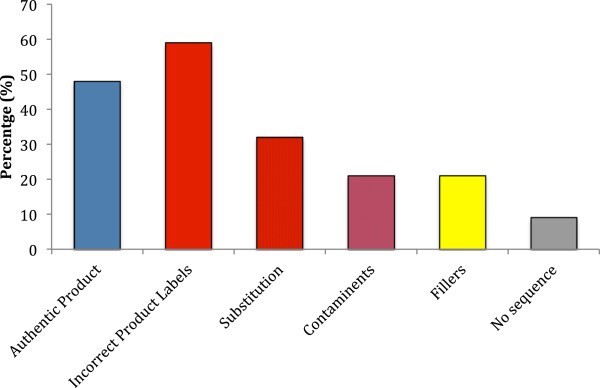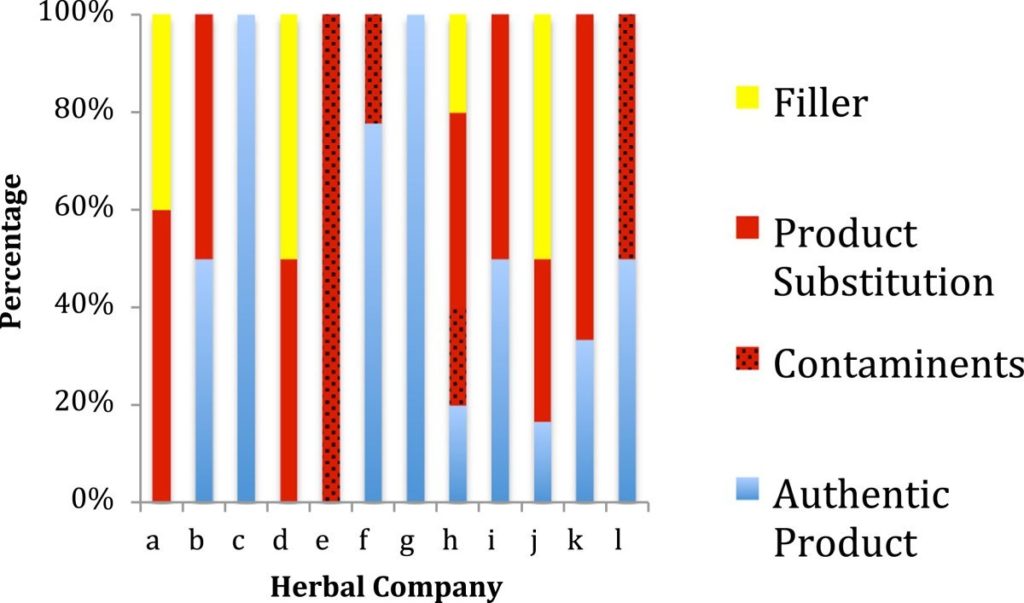Unfortunately I have some bad news for you today. As you probably know, I advocate smart supplementation as part of your acne treatment program. Studies have indeed shown antioxidants can be good for the skin, and that certain herbs can correct hormonal problems linked to acne.
However, all the studies in the world aren’t worth anything, if you can’t get your hands on the herbs and nutrients used in the studies.
And a recent study by Newmaster et al. shows what you think you are buying often isn’t what you get.
Herbs – you may not get what you pay for
Rencently published paper titled DNA barcoding detects contamination and substitution in North American herbal products. highlights problems with labelling of herbal supplements.
The researchers bought 44 different herbal products from 12 companies altogether containing 30 different herbs. The products were bought from mainstream supermarkets, health food stores and pharmacies in Toronto, Canada. All the products were available in both Canada and the US.
The researchers used ‘DNA fingerprinting’ to identify the substances in the bottles and compared them to known references samples. DNA fingerprinting means searching for strands of DNA and then matching those strands to known sources.
Based on the test results they labeled the products as follows:
- Authentic The DNA fingerprint of the main ingredient matches the label.
- Contamination The product contains other herbs in addition to the one in the label – note that all the products were supposed to only contain a single herb.
- Substitution The product didn’t contain any of the labeled herb but contained some other herb(s).
- Fillers The product contains known filler ingredients – wheat, rice and soybeans.
This graph shows the results:
Source: DNA barcoding detects contamination and substitution in North American herbal products.
- According to this study, only 48% of the products could be authenticated. That is, the main ingredient matched the label.
- 59% of the tested products were improperly labeled. That is, they contained plants not listed on the label. This figure also included authenticated products with some fillers and contaminants.
- In 32% of the tested products the labeled herb was substituted another herb, presumably a cheaper one. In some cases the herb in the bottle was linked to significant side-effects, potentially putting people taking the product into danger.
- 21% of the products contained fillers. Note that this figure also includes legitimate use of fillers, when they are used in addition of the main ingredient. The study only tested for 3 fillers (rice, wheat, soybean), so this figure doesn’t include products that used other fillers.
- 9% of the samples contained only fillers and none of the main product was detected.
This graph shows results for each company:
Source: DNA barcoding detects contamination and substitution in North American herbal products.
Out of the 12 companies, only 2 had all their products graded as authentic. The products from 2 companies only contained fillers and substitutions – with none of the labeled herb detected. The other 8 companies fell somewhere in between. This study only sampled a few products per company, and we can’t make generalised conclusions of the companies based on such a limited sample.
The paper didn’t name the companies, so please don’t ask me what the ‘good’ and ‘bad’ companies were, I don’t know, but if you find it out somewhere, please post to the comments below.
Industry criticism
Naturally, the herbal and supplement industry is not too thrilled about the results. American Botanical Council(ABC) wrote a detailed critique of the study. Nutra Ingredients USA also chipped in with a less technical critique.
It’s likely that due to processing the DNA fingerprinting technique could not identify the herbs in all the cases. So I’m sure some authentic products were classified as improperly labeled. Whatever the shortcomings of this study, it doesn’t change the big picture. ABC concluded their criticism of the study with this:
Besides the various errors and misleading quotes, perhaps most problematic aspect of the paper is the fact that there is already a rich literature that demonstrates that quality of herbal products is a real issue.
In other words, yes, we know there are problems with herbal products and supplements and you didn’t tell us anything new.
Call for better regulation
When I’m asked for supplement recommendations, or my opinion of a particular supplement, I often say that giving such recommendations is difficult. I say that because it’s almost impossible to know what’s in the bottles.
The supplement and herbal products industry is so poorly regulated that just about anyone can set up a shop manufacturing and selling supplements. There are ‘white label’ manufacturers who manufacture the products for you and you can just slap your own label on the bottles – I’ve even considered getting into the business. I presume that the vast majority of supplement companies don’t actually produce their own products.
Much like drug companies, the supplement makers are in the business to make money. If no one holds them accountable, it’s only natural they would substitute more expensive herbs with fillers and cheaper herbs.
This is why I find it so ironic that anytime a legislation designed to improve accountability of supplement companies and labelling of supplements is introduced, ‘health freedom’ advocates are up in arms crying that the government is taking away their freedoms. The only thing being ‘stolen’ is your inability to know what’s in the bottles.
The industry is of course happy to flame such sentiments since the current legislation allows them to avoid costly testing and authentication. And make no mistake, the supplement business is big business, to the tune of $30 Billion per year.
Concluding remarks
Clearly, there are problems with the herbal and supplement industries. In the previous post I wrote about some herbs that can help female hormonal acne. Let’s say that you take my advice and want to try some of the herbs. How do you know that the bottle you bought actually contains the herb you want? You don’t. And you can’t. This makes it even harder to get clear.
For someone with celiac disease or gluten sensitivity, it’s not thrilling to know that supplements could contain undisclosed wheat.
Without imposing stricter regulation on supplement companies, I don’t see any solution to this problems. For now the best you can do is to rely on a brand and hope you can trust the company.
And before anyone asks, I have no insider information on supplement companies. I don’t know which ones are good and which ones are not. If you know a company you can trust, please share it in the comments below. Let’s try to influence things by voting with our dollars.





wouldn’t a GMP certification be an assurance?
I don’t know. I don’t know what GMP certificate actually mandates.
I buy from seeking health as I also have a mthfr gene mutation and I believe the company to be honest.
Let’s hope they live up to your expectations.
hi seppo,
what supplements do you reccomend?
are there any all round ones that you would advise?
and what moisurisers would you advise using?
thanks for your time
Most supplement recommendations are case-specific. Zinc is perhaps the closest to a universal recommendation for anyone with acne to try.
Antioxidant supplements can help people with moderate to severe acne or people under higher than normal oxidative stress, say smokers. Berberine is likely to be helpful for people with insulin resistance and for women with hormonal acne.
Grab the free report about 5 top skincare products for recommended antioxidant creams/moisturizers.
Sad but true, and I suspect it’s the same in food industry. In my country (EU) parents of tragically deceased girl (peanut allergy) claim that labels saying “may contain” or “contains trace amounts of…” are misleading. The products may have none to significant amount of allergen that could be another ingredient on the list. The manufacturers feel safe from law suits by putting untrue information. (Lab check of praline caused their daughter death and few other sweets confirmed that). For me it was very important news as my skin problems are caused mostly by gut and allergy issues. Eating processed and long storage foods gave me strong gut reactions, many times unexplained. It didn’t cause acne right away but inflammation showed on my skin sooner or later. Long time ago I removed all herbal teas and supplements from my diet, left one ridiculously expensive brand of supplements I react well to, just being afraid of another unexpected problems. Basing on my reactions I wouldn’t believe in labels of spices also – there must be literally everything there. My suspicion may or may not be true, but it’s worth to consider especially when someone feels that is reacting randomly to everything. The study showed I’m at least partly right. I’m living on a very strict diet, but I wouldn’t do that if acne was my only problem. What Seppo writes about restricting diets and holistic healers making us believe diet is cause of everything is true. There are other fields to work on. Curing yourself with diet only has nothing to do with what some guru says is best for you but learning a lot about diets, physiology, finding your triggers which in some cases is takes long years of restrictions and self observations – many times it’s just not worth it. Good starting strategy is just being reasonable.
Thanks for your thoughtful comment. Side note, if it feels like everything is causing acne, look into histamine intolerance. I know it’s a factor in many people’s skin problems.